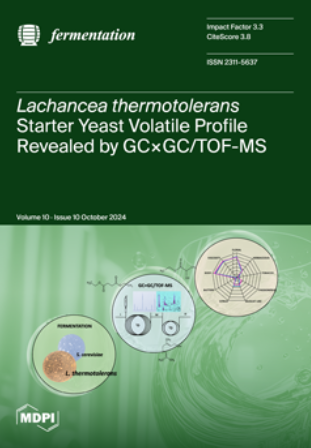The Microbial Community in a Substrate of Solid-State Fermentation by Lentinula edodes: A Preliminary Study
IF 3.3
3区 农林科学
Q2 BIOTECHNOLOGY & APPLIED MICROBIOLOGY
引用次数: 0
Abstract
Edible-fungal-based solid-state fermentation holds promise for sustainable food and biofuel production. Understanding the role of microbial communities in fungal substrates is crucial. Birch-based substrates were treated with autoclaving (121 °C, at 2 bar) or hot air pasteurization (75–100 °C), followed by incubation with and without shiitake (Lentinula edodes) inoculum. Mycelial growth was monitored by CO2 release and microbial biomass by phosphate-lipid fatty acid (PLFA). DNA sequencing was used to analyze the microbial communities. Results showed successful colonization of shiitake on all substrates, regardless of pasteurization temperatures and coexisting microbes. Total microbial respiration (CO2) and PLFA biomass showed no significant differences between pasteurization regimes. However, significant microbial differences were found between shiitake-inoculated and non-inoculated treatments. DNA sequencing revealed the dominance of Phyllobacterium, Sphingomonas, and Pelomonas genera in all inoculated substrates, while non-inoculated substrates were abundant in Bacillus spp. and Paenibacillus spp. of the Firmicutes phylum. This study provides preliminary insights into the microbial community in birch-based shiitake substrates, facilitating further investigation of bacteria involved in shiitake mycelium growth promotion and biochemical conversion for biofuel production.香菇固态发酵底物微生物群落的初步研究
以食用菌为基础的固态发酵为可持续食品和生物燃料生产带来了希望。了解微生物群落在真菌基质中的作用是至关重要的。用高压灭菌(121°C, 2bar)或热风巴氏灭菌(75-100°C)处理桦木基底物,然后用和不含香菇(Lentinula edodes)接种物孵育。采用CO2释放法和磷酸脂脂肪酸(PLFA)法监测菌丝生长。采用DNA测序对微生物群落进行分析。结果表明,无论巴氏灭菌温度和共存微生物如何,香菇都能在所有基质上成功定植。总微生物呼吸(CO2)和PLFA生物量在不同的巴氏灭菌方案之间没有显著差异。然而,接种和未接种香菇处理之间的微生物差异显著。DNA测序结果显示,在所有接种底物中均以Phyllobacterium、Sphingomonas和Pelomonas属为主,而在厚壁菌门的芽孢杆菌属和Paenibacillus属中未接种底物丰富。该研究初步揭示了桦木香菇基质中的微生物群落,为进一步研究促进香菇菌丝生长和生物化学转化用于生物燃料生产的细菌提供了基础。
本文章由计算机程序翻译,如有差异,请以英文原文为准。
求助全文
约1分钟内获得全文
求助全文
来源期刊

Fermentation-Basel
BIOTECHNOLOGY & APPLIED MICROBIOLOGY-
CiteScore
3.80
自引率
18.90%
发文量
594
审稿时长
7 weeks
期刊介绍:
Fermentation-Basel is an international open access journal published by MDPI, focusing on fermentation-related research, including new and emerging products, processes and technologies, such as biopharmaceuticals and biotech drugs. The journal enjoys a good reputation in the academic community and provides a high-impact forum for researchers in the field of bioengineering and applied microbiology.
 求助内容:
求助内容: 应助结果提醒方式:
应助结果提醒方式:


